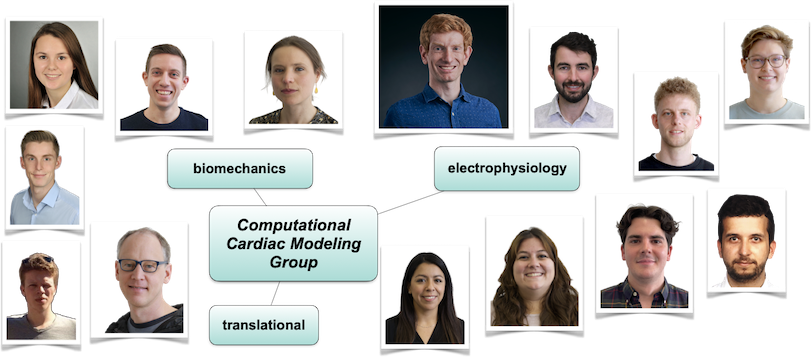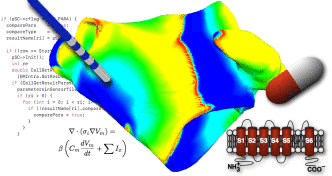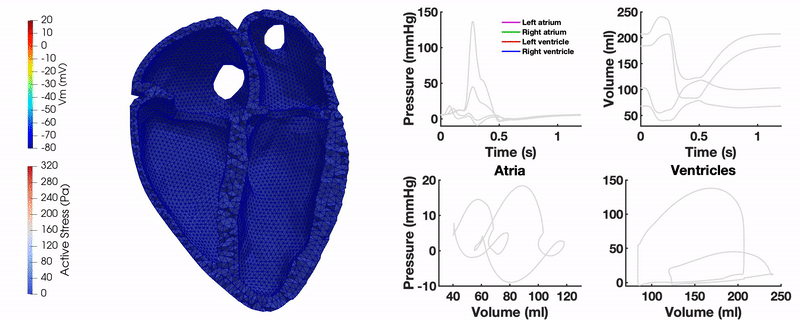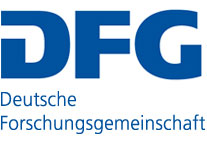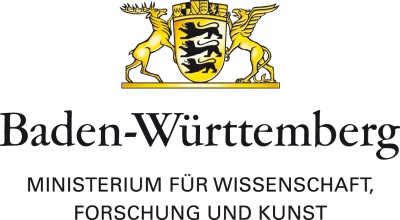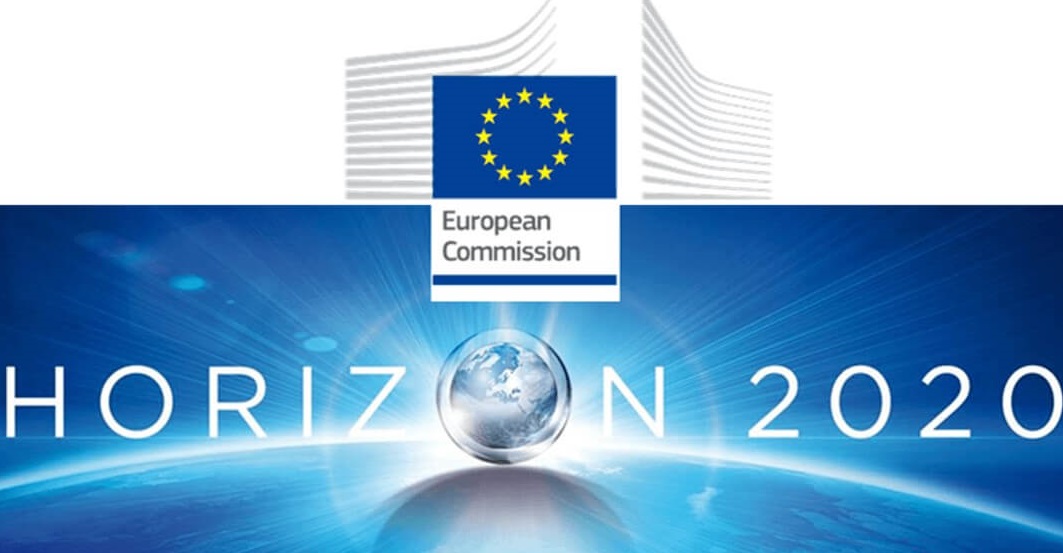Leverage engineering methods of computational modeling to improve patient care in cardiac medicine
_rdax_1240x825s.jpg)
|
The Computational Cardiac Modeling group (head: Axel Loewe) aims at formulating the heart's function mathematically and realistically representing it with computational models. Our research is focused on the electrophysiology and mechanics of the heart, which we represent with multiscale models. These models include several biological levels of integration from ion channels via cells to tissues and organs and the relevant phenomena span a multitude of temporal and spatial scales (microseconds to minutes; micrometers to centimeters).
|
|
Media
Videos
- Synergies between mechanistic and data-driven models in medical research (HIDA Lectures @ HIDSS4Health, English)
- Mathematische Computermodelle des Herzens in der Medizin (KIT im Rathaus, German)
Podcasts
- Zentimetergenaue Lokalisierung durch Künstliche Intelligenz (Campus-Report, German)
- Unveiling the Digital Heart Twin (A Coffee with, ZEISS, English)
- What ECG can tell us about the events on a molecular scale (Frontiers in Kidney Medicine and Biology, English)
Publications
All Publications, sorted by year
2024 2023 2022 2021 2020 2019 2018 2017 2016 2015 2014 2013 2011 2010 [All]
Selected Publications
Journal Articles (123)
Enhancing premature ventricular contraction localization through electrocardiographic imaging and cardiac digital twins.
In Computers in Biology and Medicine, vol. 190, pp. 109994, 2025
Digitale Zwillinge - Mit hoch skalierbaren Algorithmen simulieren Supercomputer Patientenherzen.
In c't Magazin für Computertechnik(7) , pp. 124-127, 2025
Consensus statement on the credibility assessment of machine learning predictors.
In Briefings in Bioinformatics, vol. 26(2) , 2025
openCARP: Personalized Computational Model of the Heart Examines Cardiac Rhythm.
In SIAM News, vol. 58(2) , pp. 7-8, 2025
Computational modelling of biological systems now and then: revisiting tools and visions from the beginning of the century.
In preprint, 2025
Cardiac fibrosis affects electrical conduction and arrhythmogenesis in a pacing-rate-dependent manner.
In preprint, 2025
A cyclical fast iterative method for simulating reentries in cardiac electrophysiology using an eikonal-based model.
In Engineering with Computers, 2025
Comparison of LGE-MRI and Local Impedance Data Recorded in Human Left Atria.
In Current Directions in Biomedical Engineering, vol. 10(4) , pp. 623-626, 2024
Modeling Human Ventricular Cardiomyocyte Force-Frequency Relationship.
In Current Directions in Biomedical Engineering, vol. 10(4) , pp. 212-215, 2024
Impact of effective refractory period personalization on arrhythmia vulnerability in patient-specific atrial computer models..
In Europace : European pacing, arrhythmias, and cardiac electrophysiology : journal of the working groups on cardiac pacing, arrhythmias, and cardiac cellular electrophysiology of the European Society of Cardiology, vol. 26(10) , 2024
In Silico TRials guide optimal stratification of ATrIal FIbrillation patients to Catheter Ablation and pharmacological medicaTION: the i-STRATIFICATION study.
In Europace, vol. 26(6) , 2024
ECG Feature Importance Rankings: Cardiologists vs. Algorithms..
In IEEE journal of biomedical and health informatics, vol. PP, 2024
Numerical evaluation of elasto‐mechanical and visco‐elastic electro‐mechanical models of the human heart.
In GAMM-Mitteilungen, vol. 46(3-4) , 2024
The right atrium affects in silico arrhythmia vulnerability in both atria.
In Heart Rhythm, 2024
AugmentA: Patient-specific augmented atrial model generation tool..
In Computerized medical imaging and graphics : the official journal of the Computerized Medical Imaging Society, vol. 108, pp. 102265-102265, 2023
Non-invasive localization of the ventricular excitation origin without patient-specific geometries using deep learning..
In Artificial Intelligence in Medicine, vol. 143, pp. 102619, 2023
Impact of the Right Atrium on Arrhythmia Vulnerability.
In Current Directions in Biomedical Engineering, vol. 9(1) , pp. 142-145, 2023
MedalCare-XL: 16,900 healthy and pathological synthetic 12 lead ECGs from electrophysiological simulations..
In Scientific data, vol. 10(1) , pp. 531-531, 2023
Differences in atrial substrate localization using late gadolinium enhancement-magnetic resonance imaging, electrogram voltage, and conduction velocity: a cohort study using a consistent anatomical reference frame in patients with persistent atrial fibrillation.
In Europace, vol. 25(9) , 2023
Spatial correlation of left atrial low voltage substrate in sinus rhythm versus atrial fibrillation: The rhythm specificity of atrial low voltage substrate.
In Journal of Cardiovascular Electrophysiology, vol. 34(8) , pp. 1613-1621, 2023
PTB-XL+, a comprehensive electrocardiographic feature dataset..
In Scientific data, vol. 10(1) , pp. 279-279, 2023
The Impact of Standard Ablation Strategies for Atrial Fibrillation on Cardiovascular Performance in a Four-Chamber Heart Model.
In Cardiovascular Engineering and Technology, vol. 14(2) , pp. 296-314, 2023
Recommender system for ablation lines to treat complex atrial tachycardia.
In Computer Methods and Programs in Biomedicine, vol. 231, pp. 107406, 2023
Personalized ablation vs. conventional ablation strategies to terminate atrial fibrillation and prevent recurrence.
In EP Europace, vol. 25(1) , pp. 211-222, 2023
Comparison of Propagation Models and Forward Calculation Methods on Cellular, Tissue and Organ Scale Atrial Electrophysiology.
In IEEE Transactions on Biomedical Engineering, vol. 70(2) , pp. 511-522, 2023
Structural and electrophysiological determinants of atrial cardiomyopathy identify remodeling discrepancies between paroxysmal and persistent atrial fibrillation.
In Frontiers in Cardiovascular Medicine, vol. 9, pp. 1-18, 2023
Functional Characterization of a Spectrum of Novel Romano-Ward Syndrome KCNQ1 Variants.
In International Journal of Molecular Sciences, vol. 24(2) , pp. 1350, 2023
Editorial: Atrial Fibrillation: Technologies for Investigation, Monitoring and Treatment, Volume II..
In Frontiers in Physiology, vol. 14, pp. 1209458-1209458, 2023
Global Sensitivity Analysis and Uncertainty Quantification for Simulated Atrial Electrocardiograms.
In Metrology, vol. 3(1) , pp. 1-28, 2022
Efficient time splitting schemes for the monodomain equation in cardiac electrophysiology..
In International Journal for Numerical Methods in Biomedical Engineering, pp. e3666-e3666, 2022
The reverse mode of the Na+/Ca2+ exchanger contributes to the pacemaker mechanism in rabbit sinus node cells.
In Scientific Reports, vol. 12(21830) , 2022
Characterization of the pace-and-drive capacity of the human sinoatrial node: A 3D in silico study..
In Biophysical journal, vol. 121(22) , pp. 4247-4259, 2022
A Large-scale Virtual Patient Cohort to Study ECG Features of Interatrial Conduction Block.
In Current Directions in Biomedical Engineering, vol. 8(2) , pp. 97-100, 2022
Refining the Eikonal Model to Reproduce the Influence of Atrial Tissue Geometry on Conduction Velocity.
In Current Directions in Biomedical Engineering, vol. 8(2) , pp. 133-136, 2022
Hybrid machine learning to localize atrial flutter substrates using the surface 12-lead electrocardiogram.
In EP Europace, vol. 24(7) , pp. 1186-1194, 2022
Reducing Line-of-Block Artifacts in Cardiac Activation Maps Estimated Using ECG Imaging: A Comparison of Source Models and Estimation Methods.
In IEEE Transactions on Biomedical Engineering, vol. 69(6) , pp. 2041-2052, 2022
A Review of Healthy and Fibrotic Myocardium Microstructure Modeling and Corresponding Intracardiac Electrograms.
In Frontiers in Physiology, vol. 13, 2022
Dyssynchronous Left Ventricular Activation is Insufficient for the Breakdown of Wringing Rotation.
In Frontiers in Physiology, vol. 13, 2022
A Bi-atrial Statistical Shape Model as a Basis to Classify Left Atrial Enlargement from Simulated and Clinical 12-Lead ECGs.
In Statistical Atlases and Computational Models of the Heart. Multi-Disease, Multi-View, and Multi-Center Right Ventricular Segmentation in Cardiac MRI Challenge, vol. 13131, pp. 38-47, 2022
The openCARP CDE - Concept for and implementation of a sustainable collaborative development environment for research software.
In Bausteine Forschungsdatenmanagement, vol. 2022(1) , pp. 64-84, 2022
Influence of pressure boundary condition definition on flow patterns in cardiac simulations.
In Modeling the Cardiac Function, 2022
Editorial: Atrial Fibrillation: Technology for Diagnosis, Monitoring, and Treatment.
In Frontiers in Physiology, vol. 13, 2022
Machine Learning Using a Single-Lead ECG to Identify Patients With Atrial Fibrillation-Induced Heart Failure.
In Frontiers in Cardiovascular Medicine, vol. 9, 2022
An automate pipeline for generating fiber orientation and region annotation in patient specific atrial models.
In Current Directions in Biomedical Engineering, vol. 7(2) , pp. 136-139, 2021
The openCARP simulation environment for cardiac electrophysiology..
In Computer Methods and Programs in Biomedicine, vol. 208, pp. 106223, 2021
Non-Invasive and Quantitative Estimation of Left Atrial Fibrosis Based on P Waves of the 12-Lead ECG—A Large-Scale Computational Study Covering Anatomical Variability.
In Journal of Clinical Medicine, vol. 10(8) , pp. 1797, 2021
Cycle length statistics during human atrial fibrillation reveal refractory properties of the underlying substrate: a combined in silico and clinical test of concept study..
In EP Europace, vol. 23(Supplement_1) , pp. i133-i142, 2021
An environment for sustainable research software in Germany and beyond: current state, open challenges, and call for action.
In F1000Research, vol. 9, pp. 295, 2021
Non-Invasive Characterization of Atrial Flutter Mechanisms Using Recurrence Quantification Analysis on the ECG: A Computational Study.
In IEEE Transactions on Biomedical Engineering, vol. 68(3) , pp. 914-925, 2021
Estimating cardiac active tension from wall motion—An inverse problem of cardiac biomechanics.
In International Journal for Numerical Methods in Biomedical Engineering, vol. 37(12) , pp. e3448, 2021
Machine learning enables noninvasive prediction of atrial fibrillation driver location and acute pulmonary vein ablation success using the 12-lead ECG.
In Cardiovascular Digital Health Journal, vol. 2(2) , pp. 126-136, 2021
Causes of altered ventricular mechanics in hypertrophic cardiomyopathy: an in-silico study.
In BioMedical Engineering OnLine, vol. 20(1) , pp. 69, 2021
Possible Contexts of Use for In Silico Trials Methodologies: A Consensus-Based Review.
In IEEE Journal of Biomedical and Health Informatics, vol. 25(10) , pp. 3977-3982, 2021
A Reproducible Protocol to Assess Arrhythmia Vulnerability : Pacing at the End of the Effective Refractory Period..
In Frontiers in Physiology, vol. 12, pp. 656411, 2021
CVAR-Seg: An Automated Signal Segmentation Pipeline for Conduction Velocity and Amplitude Restitution..
In Frontiers in Physiology, vol. 12, pp. 673047, 2021
Electro-Mechanical Whole-Heart Digital Twins: A Fully Coupled Multi-Physics Approach.
In Mathematics, vol. 9(11) , pp. 1247, 2021
Using Machine Learning to Characterize Atrial Fibrotic Substrate From Intracardiac Signals With a Hybrid in silico and in vivo Dataset.
In Frontiers in Physiology, vol. 12, pp. 699291, 2021
Non-invasive body surface electrocardiographic imaging for diagnosis of atrial cardiomyopathy.
In EP Europace, vol. 23(12) , pp. 2010-2019, 2021
Cobiveco: Consistent biventricular coordinates for precise and intuitive description of position in the heart – with MATLAB implementation.
In Medical Image Analysis, vol. 74, pp. 102247, 2021
A Fully-Coupled Electro-Mechanical Whole-Heart Computational Model: Influence of Cardiac Contraction on the ECG.
In Frontiers in Physiology, vol. 12, 2021
Atrial Flutter Mechanism Detection Using Directed Network Mapping.
In Frontiers in Physiology, vol. 12, 2021
Sequential Coupling Shows Minor Effects of Fluid Dynamics on Myocardial Deformation in a Realistic Whole-Heart Model..
In Frontiers in cardiovascular medicine, vol. 8, pp. 768548, 2021
A bi-atrial statistical shape model for large-scale in silico studies of human atria: model development and application to ECG simulations.
In Medical Image Analysis, vol. 74, pp. 102210, 2021
Quantification and classification of potassium and calcium disorders with the electrocardiogram: What do clinical studies, modeling, and reconstruction tell us?.
In APL Bioengineering, vol. 4(4) , pp. 041501, 2020
Comparison of Unipolar and Bipolar Voltage Mapping for Localization of Left Atrial Arrhythmogenic Substrate in Patients With Atrial Fibrillation.
In Frontiers in Physiology, vol. 11, pp. 575846, 2020
Monitoring the dynamics of acute radiofrequency ablation lesion formation in thin-walled atria – a simultaneous optical and electrical mapping study.
In Biomedical Engineering / Biomedizinische Technik, vol. 65(3) , pp. 327-341, 2020
Pharmacologic TWIK‐Related Acid‐Sensitive K+ Channel (TASK‐1) Potassium Channel Inhibitor A293 Facilitates Acute Cardioversion of Paroxysmal Atrial Fibrillation in a Porcine Large Animal Model.
In Journal of the American Heart Association, vol. 9(10) , 2020
Specific Electrogram Characteristics Identify the Extra-Pulmonary Vein Arrhythmogenic Sources of Persistent Atrial Fibrillation – Characterization of the Arrhythmogenic Electrogram Patterns During Atrial Fibrillation and Sinus Rhythm.
In Scientific Reports, vol. 10(1) , pp. 9147, 2020
Modeling selective therapeutic hypothermia in case of acute ischemic stroke using a 1D hemodynamics model and a simplified brain geometry..
In Mathematical biosciences and engineering : MBE, vol. 17(2) , pp. 1147-1167, 2020
Novel Na/Ca Exchanger Inhibitor ORM-10962 Supports Coupled Function of Funny-Current and Na/Ca Exchanger in Pacemaking of Rabbit Sinus Node Tissue..
In Frontiers in Pharmacology, vol. 10, pp. 1632, 2020
Mapping and Removing the Ventricular Far Field Component in Unipolar Atrial Electrograms..
In IEEE Transactions on Biomedical Engineering, vol. 67(10) , pp. 2905-2915, 2020
Investigating the correlation of local rate dependency of atrial conduction velocity and voltage.
2019
Patient-Specific Identification of Atrial Flutter Vulnerability–A Computational Approach to Reveal Latent Reentry Pathways.
In Frontiers in Physiology, vol. 9(Article 1910) , 2019
Hypocalcemia-Induced Slowing of Human Sinus Node Pacemaking.
In Biophysical Journal, vol. 117(12) , pp. 2244-2254, 2019
Influence of ECG Lead Reduction Techniques for Extracellular Potassium and Calcium Concentration Estimation.
In Current Directions in Biomedical Engineering, vol. 5(1) , pp. 69-72, 2019
A robust computational framework for estimating 3D Bi-Atrial chamber wall thickness.
In Computers in Biology and Medicine, vol. 114, pp. 103444, 2019
Influence of Fibrotic Tissue Arrangement on Intracardiac Electrograms During Persistent Atrial Fibrillation.
2019
Influence of left atrial size on P-wave morphology: differential effects of dilation and hypertrophy.
2018
An adaptive spatio-temporal Gaussian filter for processing cardiac optical mapping data.
In Computers in Biology and Medicine, vol. 102, pp. 267-277, 2018
Cardiac ischemia-insights from computational models..
In Herzschrittmachertherapie & Elektrophysiologie, vol. 29(1) , pp. 48-56, 2018
Automatic Identification of Reentry Mechanisms and Critical Sites during Atrial Tachycardia by Analyzing Areas of Activity..
In IEEE Transactions on Bio-Medical Engineering, vol. 65(10) , pp. 2334-2344, 2018
Regional conduction velocity calculation from clinical multichannel electrograms in human atria.
In Computers in Biology and Medicine, vol. 92, pp. 188-196, 2018
Novel Electrocardiographic Criteria for Real-Time Assessment of Anterior Mitral Line Block.
In JACC: Clinical Electrophysiology, vol. 4(7) , pp. 920-932, 2018
A Computational Framework to Benchmark Basket Catheter Guided Ablation in Atrial Fibrillation.
In Frontiers in Physiology, vol. 9, pp. 1251, 2018
Modelling of patient-specific Purkinje activation based on measured ECGs.
In Current Directions in Biomedical Engineering, vol. 3(2) , pp. 171-174, 2017
Mini Electrodes on Ablation Catheters: Valuable Addition or Redundant Information? Insights from a Computational Study.
In Computational and Mathematical Methods in Medicine, vol. 2017(Article ID 168629) , pp. 13, 2017
Model Assisted Biosignal Analysis of Atrial Electrograms.
In Technisches Messen, vol. 83(2) , pp. 102-111, 2016
Influence of the earliest right atrial activation site and its proximity to interatrial connections on P-wave morphology.
In Europace, vol. 18(suppl 4) , pp. iv35-iv43, 2016
Parameter estimation of ion current formulations requires hybrid optimization approach to be both accurate and reliable.
In Frontiers in Bioengineering and Biotechnology, vol. 3, pp. 209, 2016
Basket-Type Catheters: Diagnostic Pitfalls caused by Deformation and Limited Coverage.
In BioMed Research International, vol. Article ID 5340574, pp. 1-13, 2016
ECG imaging of focal atrial excitation: Evaluation in a realistic simulation setup.
In Computing in Cardiology, vol. 43, pp. 113-116, 2016
Left and Right Atrial Contribution to the P-wave in Realistic Computational Models.
In Functional Imaging and Modeling of the Heart, vol. 9126(9126) , pp. 439-447, 2015
Mesh structure-independent modeling of patient-specific atrial fiber orientation.
In Current Directions in Biomedical Engineering, vol. 1(1) , pp. 409-412, 2015
In-silico assessment of the dynamic effects of amiodarone and dronedarone on human atrial patho-electrophysiology..
In Europace, vol. 16(S4) , pp. iv30-iv38, 2014
ECG-Based Detection of Early Myocardial Ischemia in a Computational Model: Impact of Additional Electrodes, Optimal Placement, and a New Feature for ST Deviation.
In BioMed Research International Article, vol. 2015, pp. 530352, 2014
Arrhythmic potency of human ether-a-go-go-related gene mutations L532P and N588K in a computational model of human atrial myocytes.
In Europace, vol. 16(3) , pp. 435-443, 2014
Books (1)
Book of Abstracts - Workshop on Cardiac Modeling. - Towards an integrated numerical heart model, Coupling the relevant physics the right way.
April 15-17 2019, Bad Herrenalb, Germany. 2019.
Book Chapters (6)
Model Development.
In Synthesis Lectures on Biomedical Engineering, Springer Nature Switzerland, Cham, pp. 25-42, 2024
The Investigator: Modellers and Analysts.
In Synthesis Lectures on Biomedical Engineering, Springer Nature Switzerland, Cham, pp. 115-122, 2024
Automated Software Metadata Conversion and Publication Based on CodeMeta.
In E-Science-Tage 2023: Empower Your Research – Preserve Your Data, heiBOOKS, pp. 228-234, 2023
Simulated Excitation Patterns in the Atria and Their Corresponding Electrograms.
In Functional Imaging and Modeling of the Heart, Springer Nature Switzerland, Cham, pp. 204-212, 2023
Machine Learning for Clinical Electrophysiology.
In Innovative Treatment Strategies for Clinical Electrophysiology, Springer Nature Singapore, Singapore, pp. 93-109, 2022
Cardiac Digital Twin Modeling.
In Innovative Treatment Strategies for Clinical Electrophysiology, Springer Nature Singapore, Singapore, pp. 111-134, 2022
Conference Contributions (145)
Centrality Measures from Directed Network Mapping Identify Reentries Suggesting Different Mechanisms of Atrial Flutter.
In 2024 Computing in Cardiology Conference, vol. 51, 2024
In Silico Local Impedance Mapping Using Multielectrode Catheters.
In 2024 Computing in Cardiology Conference, vol. 51, 2024
Enriched and Discontinuous Galerkin Discretizations for a Cardiac Mechanics Benchmark Problem.
In 2024 Computing in Cardiology Conference, vol. 51, 2024
DIVAID: Automatic Division of Bi-Atrial Geometries into Clinically Important Regions.
In 2024 Computing in Cardiology Conference, vol. 51, 2024
Facilitating Reproducible In Silico Experiments with openCARP: A Step toward FAIR and Open Science in Cardiac Electrophysiology.
In 2024 Computing in Cardiology Conference, vol. 51, 2024
Development of a User-Friendly Pipeline for Constructing Atrial Models at Scale: Importance of the End-User for Clinical Uptake.
In 2024 Computing in Cardiology Conference, vol. 51, 2024
Influence of Conduction Velocity Restitution Steepness on Atrial Fibrillation Vulnerability and Maintenance.
In 2024 Computing in Cardiology Conference, vol. 51, 2024
CAPPA: Consistent Analysis of Action Potential Parameters for Various Types of Cardiomyocytes.
In 2024 Computing in Cardiology Conference, vol. 51, 2024
Insights from Explainable Machine Learning on Biatrial Arrhythmia Vulnerability Assessment.
In 2024 Computing in Cardiology Conference, vol. 51, 2024
Standardized regionalization of the atria for 3D cardiac imaging, electroanatomical mapping and computational modeling. A multidisciplinary consensus of the PersonalizeAF consortium.
In 90. Jahrestagung der Deutsche Gesellschaft für Kardiologie – Herz- und Kreislaufforschung e.V. (German Cardiac Society), vol. 113(8) , pp. 1285-1285, 2024
Standardized regionalization of the atria for 3D cardiac imaging, electroanatomical mapping and computational modeling. A multidisciplinary consensus of the PersonalizeAF consortium.
In Europace, vol. 26(Supplement_1) , 2024
PO-02-078 Standardized regionalization of the atria for 3D cardiac imaging, electroanatomical mapping and computational modeling – A multidisciplinary consensus of the PersonalizeAF consortium.
In Heart Rhythm, vol. 21(5) , pp. S292, 2024
Electrograms in a Cardiac Cell-by-Cell Model.
In Workshop Biosignale, 2024
Integrating the Right Atrium in Patient-Specific Computer Models Increases Arrhythmia Vulnerability of the Left Atrium.
In 90. Jahrestagung der Deutsche Gesellschaft für Kardiologie – Herz- und Kreislaufforschung e.V. (German Cardiac Society), 2024
Discrepancy Between LGE-MRI and Electro-Anatomical Mapping for Regional Detection of Pathological Atrial Substrate.
In Current Directions in Biomedical Engineering, vol. 9(1) , pp. 483-486, 2023
Impact of effective refractory period personalization on prediction of atrial fibrillation vulnerability.
In Europace, vol. 25(Supplement_1) , 2023
Impact of effective refractory period personalization on prediction of atrial fibrillation vulnerability.
In EHRA 2023, 2023
Inflammation-Induced Remodeling and Atrial Arrhythmias in Systemic Lupus Erythematosus: In Silico Insights.
In 2023 Computing in Cardiology (CinC)(10363691) , pp. 1-4, 2023
In Silico Computation of Electrograms and Local Electrical Impedance to Assess Non-Transmural Fibrosis.
In 2023 Computing in Cardiology (CinC)(10363691) , pp. 1-4, 2023
Whole Heart Simulation of Severe Aortic Stenosis Using a Lumped Parameter Model of Heart Valve Dynamics.
In 2023 Computing in Cardiology (CinC)(10363691) , pp. 1-4, 2023
In-Silico Trials Guide Optimal Stratification of Atrial Fibrillation Patients to Catheter Ablation vs Pharmacological Medication: The i-STRATIFICATION Study.
In 2023 Computing in Cardiology (CinC)(10363691) , pp. 1-4, 2023
Improving Clinical ECG-based Atrial Fibrosis Quantification With Neural Networks Through in silico P waves From an Extensive Virtual Patient Cohort.
In 2022 Computing in Cardiology Conference, vol. 49, 2022
Electrogram analysis reveals ionic current dysregulation relevant for atrial fibrillation.
In 2022 Computing in Cardiology Conference, vol. 49, 2022
Multi-Class ECG Feature Importance Rankings: Cardiologists vs. Algorithms.
In 2022 Computing in Cardiology Conference, vol. 49, 2022
Diffusion Reaction Eikonal Alternant Model: Towards Fast Simulations of Complex Cardiac Arrhythmias.
In 2022 Computing in Cardiology Conference, vol. 49, 2022
Personalized Modeling of Atrial Activation and P-waves: a Comparison Between Invasive and Non-Invasive Cardiac Mapping.
In 2022 Computing in Cardiology Conference, vol. 49, 2022
Sensitivity Analysis of Electrocardiogram Features to Computational Model Input Parameters.
In 2022 Computing in Cardiology Conference, vol. 49, 2022
Effect of Contact Force on Local Electrical Impedance in Atrial Tissue - an In Silico Evaluation.
In 2022 Computing in Cardiology Conference, vol. 49, 2022
Cardiac fluid dynamics based on immersed boundary method for application in hypertrophic cardiomyopathy.
In 7th International Conference on Computational & Mathematical Biomedical Engineering - CMBE2021, pp. 439 - 442, 2022
Automated Framework for the Augmentation of Missing Anatomical Structures and Generation of Personalized Atrial Models from Clinical Data.
In Computing in Cardiology Conference (CinC), vol. 48, 2021
Influence of Geometrical Properties for the Calculation of a Pressure-Free Whole Heart Geometry.
In 14th WCCM-ECCOMAS Congress 2020, pp. 1-9, 2021
Spatial and quantitative assessment of the correlation between sinus rhythm and atrial fibrillation voltage mapping to identify low voltage substrate in persistent atrial fibrillation.
In EP Europace, vol. 23(Supplement_3) , 2021
Influence of the Right Atrium for Arrhythmia Vulnerability: Geometry Inference Using a Statistical Shape Model.
In 4th Atrial Signals Proceedings, pp. 9, 2021
Fluid dynamics in the human heart: Altered vortex formation and wash-out in mitral regurgitation simulations.
In Current Directions in Biomedical Engineering, vol. 7(2) , pp. 199-202, 2021
Separating atrial near fields and atrial far fields in simulated intra-atrial electrograms.
In Current Directions in Biomedical Engineering, vol. 7(2) , pp. 175-178, 2021
Semi-Supervised vs. Supervised Learning for Discriminating Atrial Flutter Mechanisms Using the 12-lead ECG.
In Computing in Cardiology Conference (CinC), vol. 48, 2021
A sequential coupling approach for fluid-structure interaction in a patient specific whole heart geometry.
In iHEART Congress – Modelling the Cardiac Function, 2021
Source Estimation in Cardiac Fibrotic Substrate from Intracardiac Signals.
In 4th Atrial Signals Proceedings, pp. 14, 2021
Influence of Wave-Front and Atrial Tissue Properties on Eikonal Model Simulations.
In 4th Atrial Signals Proceedings, pp. 1, 2021
Directed Graph Information Flow Mapping for Characterizing Cardiac Electrical Propagation from Unannotated Unipolar Electrograms.
In HeartRhythm, vol. 18(8) , pp. S371, 2021
Characterization of the Fluid Dynamic Pressure Field in the Human Heart as a Basis for Coupled Fluid-Structure Simulations.
In BMT 2020, vol. Poster Session, pp. 259, 2020
Can Hypocalcaemia Cause Severe Sinus Bradycardia and Asystole in Dialysis Patients?.
In Clinical research in cardiology: Official journal of the German Cardiac Society, vol. 109(Suppl 1) , pp. 1, 2020
Automatic classification of 20 different types of atrial tachycardia using 12-lead ECG signals.
In EP Europace, vol. 22(Supplement_1) , 2020
Automatic ECG-based Discrimination of 20 Atrial Flutter Mechanisms: Influence of Atrial and Torso Geometries.
In 2020 Computing in Cardiology(9344051) , pp. 1-4, 2020
Consequences of Using an Orthotropic Stress Tensor for Left Ventricular Systole.
In 2020 Computing in Cardiology Conference (CinC), vol. 47, 2020
openCARP: An Open Sustainable Framework for In-Silico Cardiac Electrophysiology Research.
In Computing in Cardiology, vol. 47, 2020
Phase Singularities in Cardiac Patch Model with Non-conductive Fibrotic Area during Atrial Fibrillation.
In Computing in Cardiology Conference (CinC), vol. 47, 2020
Impact of Electrode Size on Electrogram Voltage in Healthy and Diseased Tissue.
In Computing in Cardiology Conference (CinC), vol. 47, 2020
An In-silico Study Into The Impact of Electrophysiological Variability at the Cellular Level on the Reentry Patterns in Atrial Fibrillation.
In Computing in Cardiology Conference (CinC), vol. 47, 2020
Non-invasive identification of atrial fibrillation driver location using the 12-lead ECG: pulmonary vein rotors vs. other locations.
In EMBC 20, 2020
Optimization Framework to Identify Constitutive Law Parameters of the Human Heart.
In Current Directions in Biomedical Engineering, vol. 6(3) , pp. 95-98, 2020
Influence of Gradient and Smoothness of Atrial Wall Thickness on Initiation and Maintenance of Atrial Fibrillation.
In Computing in Cardiology Conference (CinC), 2020
Machine Learning to Find Areas of Rotors Sustaining Atrial Fibrillation From the ECG.
In Computing in Cardiology, 2020
SuLMaSS - Sustainable Lifecycle Management for Scientific Software.
In E-Science-Tage 2019: Data to Knowledge, 2019
The inverse problem of cardiac mechanics - estimation of cardiac active stress from endocardial motion tracking.
In Computational & Mathematical Biomedical Engineering Proceedings, vol. 1, pp. 91-95, 2019
Rate Dependency of Global and Local Atrial Conduction Velocity based on Intracardiac Signals.
In Deutsche Gesellschaft für Kardiologie 85. Jahrestagung Mannheim, 2019
FP616 Low Serum Calcium is Correlated with Lower Heart Rate in Elderly Dialysis Patients.
In Nephrology Dialysis Transplantation, vol. 34(S1) , 2019
Modeling of the Human Cerebral Collateral Circulation: Evaluation of the Impact on the Cerebral Perfusion in Case of Ischemic Stroke.
In Current Directions in Biomedical Engineering, vol. 5(1) , pp. 533-536, 2019
Generation of a Simplified Brain Geometry for the Calculation of Local Cerebral Temperature using a 1D Hemodynamic Model.
In Current Directions in Biomedical Engineering, vol. 5(1) , pp. 529-532, 2019
Influence of the protocol used to induce arrhythmia on atrial fibrillation vulnerability.
In Atrial Signals Conference, 2019
Inter-Species Differences in the Response of Sinus Node Cellular Pacemaking to Changes of Extracellular Calcium.
In 41st Annual International Conference of the IEEE Engineering in Medicine and Biology Society (EMBC), pp. 1875-1878, 2019
Estimating Local Therapeutic Hypothermia in Case of Ischemic Stroke Using a 1D Hemodynamics Model and an Energetic Temperature Model.
In 41st Annual International Conference of the IEEE Engineering in Medicine and Biology Society (EMBC), pp. 3983-3986, 2019
ECG-based Estimation of Potassium and Calcium Concentrations: Proof of Concept with Simulated Data.
In IEEE Engineering in Medicine and Biology (EMBC), pp. 2610-2613, 2019
Hypocalcemia-Induced Bradycardia Is More Pronounced in Male Hemodialysis Patients.
In Kidney Week 2019, vol. 30(AS) , pp. 542-543, 2019
Recurrence Quantification Analysis for Investigating Atrial Fibrillation Dynamics in a Heterogeneous Simulation Setup*.
In 41st Annual International Conference of the IEEE Engineering in Medicine and Biology Society (EMBC), pp. 2277-2280, 2019
Noise quantification and noise reduction for unipolar and bipolar electrograms.
In Computing in Cardiology (CinC), vol. 46, 2019
An In-Silico Study of the Effects of Conductance Variation on the Regionally Based Action Potential Morphology.
In Computing in Cardiology (CinC), vol. 46, 2019
12-Lead ECG Feature Identification to Discriminate Different Types of Atrial Flutter.
In 41 Annual International Conference of the IEEE Engineering in Medicine and Biology Society (EMBC), 2019
Discrimination of Atrial Flutter on Simulated 12-Lead-ECG Signals by Applying Biosignal Processing.
In Gordon Research Conference - Cardiac Arrhythmia Mechanisms, 2019
Influence of the protocol used to induce arrhythmia on atrial fibrillation vulnerability.
In 41 Annual International Conference of the IEEE Engineering in Medicine and Biology Society (EMBC), 2019
A Method for Pressure-Volume-Based Parameter Identification for a Passive Constitutive Model of Myocardium.
In RISM Congress: iHEART - Modelling the Cardiac Function, 2019
Initiation and maintenance of re-entrant cardiac propagation: a computational vulnerability study.
In Gordon Research Conference - Cardiac Arrhythmia Mechanisms, 2019
Automated Stimulus Artefact Removal for the Clinical S1-S2 Pacing Protocol.
In Engineering in Medicine and Biology Society (EMBC), 2019 Annual International Conference of the IEEE, 2019
Forcing Transmembrane Voltages to Decrease Slowly: A Temporal Regularization for ECG Imaging.
In Computing in Cardiology, vol. 45, 2018
Spatio-temporal Analysis of Multichannel Atrial Electrograms Based on a Concept of Active Areas.
In Annual International Conference of the IEEE Engineering in Medicine and Biology Society. IEEE Engineering in Medicine and Biology Society. Annual Conference, vol. 2018, pp. 490-493, 2018
Novel ECG-criteria For Real-time Assessment Of Anterior Mitral Line Block - “V1-jump” And “V1-delay”.
In Heart Rhythm, vol. 15(5S) , pp. S229, 2018
Electro-Mechanical Delay in the Human Heart: A Study on a Simple Geometry.
In Computing in Cardiology Conference (CinC), vol. 45, 2018
Haemodynamics in an elasto-mechanic model of the human heart.
In Annual Scientific Conference of the International Association of Applied Mathematics and Mechanics, 2018
Cycle Length Statistics During Atrial Fibrillation Reflect Refractory Properties of the Underlying Substrate.
In Annual Congress of the European Cardiac Arrhythmia Society, pp. 16-27 A15-61, 2018
Effects of Fibroblasts coupling on the Electrophysiology of Cardiomyocytes from Different Regions of the Human Atrium: a Simulation Study.
In 2017 Computing in Cardiology Conference, 2017
Atrial Signals Modeling Meets Biosignal Analysis.
In IFMBE Proceedings, vol. 65, pp. 723-726, 2017
Optimal ECG lead systems to maximimze left atrial information content.
In BMTMedPhys 2017, vol. 62(s1 - V73) , pp. 68, 2017
Statistical assessment of cardiac excitation by morphology-based clustering of local activation waves.
In BMTMedPhys 2017, vol. 62(S1) , pp. S120, 2017
Developing and coupling a lumped element model of the closed loop human vascular system to a model of cardiac mechanics.
In BMTMedPhys 2017, vol. 62(S1) , pp. S69, 2017
Estimating refractory periods during atrial fibrillation based on electrogram cycle lengths in a heterogeneous simulation setup.
In Current Directions in Biomedical Engineering, vol. 3(2) , pp. 317-320, 2017
An Interactive Virtual Reality Environment for Analysis of Clinical Atrial Arrhythmias and Ablation Planning.
In 2017 Computing in Cardiology Conference (CinC), vol. 44, 2017
Maximization of left atrial information through the optimization of ECG lead systems.
2017
Propagation of the primary pacemaker activity in the human heart: a computational approach.
In European Medical and Biological Engineering Conference (EMBEC), vol. 65, pp. 201, 2017
Pace-and-Drive of the Human Sinoatrial Node – A Preliminary Computational Investigation.
In Computing in Cardiology, vol. 44, 2017
Phase Analysis of Endoatrial Electrograms for 3D Rotor Detection in Atrial Fibrillation.
In Computing in Cardiology Conference, vol. 44, 2017
A Computational Framework to Benchmark Basket Catheter Guided Ablation.
In Computing in Cardiology, vol. 44, 2017
Selective Inhibition of the Cardiac Na+/Ca2+ Exchanger by a Novel Compound ORM-10962 Modulates Spontaneous Automaticity.
In European Working Group on Cardiac Cellular Electrophysiology, 2017
A Computational Study on the Electrophysiological Effects of Fibroblasts Coupling to Human Atrial Myocytes from Different Regions.
In Cardiac Physiome Project, 2017
Computational Study on Regional Differences in Pro-Arrhythmic Effects of Fibroblasts Coupling to Human Atrial Myocytes.
In TRM Forum, 2017
Validation upside down - In-silico models to sound the potential and limitations of diagnostic tools.
In TRM Forum, 2017
Effect of left atrial hypertrophy on P-wave morphology in a computational model.
In Current Directions in Biomedical Engineering, vol. 2(1) , pp. 603-606, 2016
Left Atrial Hypertrophy Increases P-Wave Terminal Force Through Amplitude but not Duration.
In Computing in Cardiology, vol. 43, pp. 1-4, 2016
P-Wave Terminal Force Is Affected by the Site of Earliest Right Atrial Activation and its Proximity to Inter-Atrial Connections Independent from Atrial Size.
In Biomedizinische Technik, vol. 61, pp. S223, 2016
P-wave terminal force is affected by site of earliest right atrial activation.
In Cardiac Physiome Project, 2016
P-wave terminal force is affected by the site of earliest right atrial activation independent from atrial size in silico.
In International Conference on Electrocardiology, 2016
Automated Initiation of Fibrillatory Excitation in Monodomain Simulations.
2016
P-wave morphology is affected by site of earliest right atrial activation: a simulation study.
In TRM Forum, 2015
In-silico Assessment of the Dynamic Effects of Amiodarone and Dronedarone on Human Atrial Patho-Electrophysiology.
In Cardiac Physiome Workshop, 2015
Understanding the cellular mode of action of vernakalant using a computational model: answers and new questions.
In Current Directions in Biomedical Engineering, vol. 1(1) , pp. 418-422, 2015
The impact of baseline wander removal techniques on the ST segment in simulated ischemic 12-lead ECG.
In Current Directions in Biomedical Engineering, vol. 1(1) , pp. 96-99, 2015
Virtualizing clinical cases of atrial flutter in a fast marching simulation including conduction velocity and ablation scars.
In Current Directions in Biomedical Engineering, vol. 1(1) , pp. 405-408, 2015
Left and Right Atrial Contribution to the P-wave in Realistic Computational Models.
In Lecture Notes in Computer Science, vol. 9126, pp. 439–447, 2015
Methods for analyzing signal characteristics of stable and unstable rotors in a realistic heart model.
In 2015 Computing in Cardiology Conference (CinC), pp. 485-488, 2015
In-silico Assessment of the Dynamic Effects of Amiodarone and Dronedarone on Human Atrial Patho-Electrophysiology.
In Atrial Signals, 2015
In-silico Assessment of the Dynamic Effects of Amiodarone and Dronedarone on Human Atrial Patho-Electrophysiology.
In Emerging Mathematical Topics in Biology and Life Sciences, 2015
Optimization of pharmacotherapy for familial atrial fibrillation in a numerical model of human atrial electrophysiology.
In Computing in Cardiology, vol. 41, pp. 745-748, 2014
Influence of chronic atrial fibrillation induced remodeling in a computational electrophysiological model.
In Biomedizinische Technik / Biomedical Engineering, vol. 59(S1) , pp. S929-S932, 2014
Specific antiarrhythmic therapy for familial atrial fibrillation in a numerical model of human atrial electrophysiology.
In Biomedizinische Technik / Biomedical Engineering, vol. 59(s1) , pp. s933-s936, 2014
Modeling human atrial patho-electrophysiology: genetic defects and pharmacological agents.
In Simula Cardiac Modeling Workshop, 2014
Elora: Enforcing Low Rank for Parallel MR Reconstruction.
In International Society for Magnetic Resonance in Medicine, pp. 2652, 2013
Fast Marching Simulation of Atrial Excitation: Towards Personalized Ablation Planning.
In TRM Forum, 2013
Impact of hERG Mutations on Simulated Human Atrial Action Potentials.
In Biomedizinische Technik/Biomedical Engineering, vol. 58(s1) , 2013
A Hybrid Optimization Approach for the Adaptation of Cardiac Ion Current Formulations to Voltage and Patch Clamp Data.
In Cardiac Physiome Workshop, 2013
Kalman Filter with Augmented Measurement Model: an ECG Imaging Simulation Study.
In FIMH, LNCS 7945, pp. 200-207, 2013
Simulating the Effects of Drugs and Genetic Defects on Atrial Electrophysiology.
In TRM Forum, 2013
Determination of optimal electrode positions of a wearable ECG monitoring system for detection of myocardial ischemia: a simulation study.
In Computing in Cardiology, vol. 38, pp. 741-744, 2011


